当代英美散文名篇选读下册6-9单元单词 加注释
- 格式:doc
- 大小:37.50 KB
- 文档页数:2
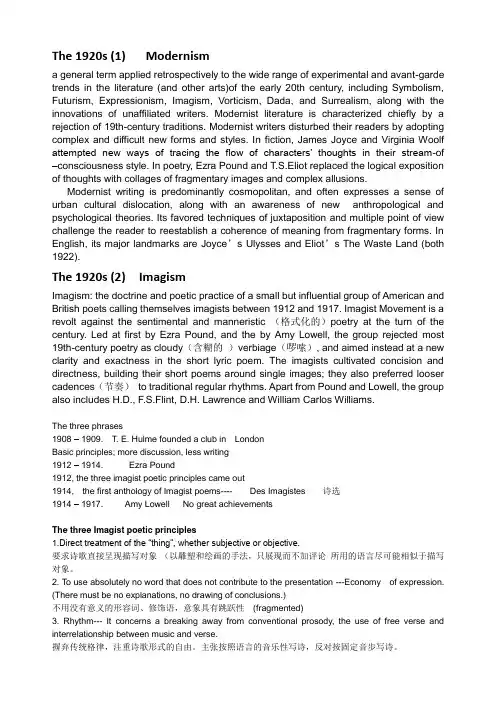
The 1920s (1) Modernisma general term applied retrospectively to the wide range of experimental and avant-garde trends in the literature (and other arts)of the early 20th century, including Symbolism, Futurism, Expressionism, Imagism, Vorticism, Dada, and Surrealism, along with the innovations of unaffiliated writers. Modernist literature is characterized chiefly by a rejection of 19th-century traditions. Modernist writers disturbed their readers by adopting complex and difficult new forms and styles. In fiction, James Joyce and Virginia Woolf attempted new ways of tracing the flow of characters’ thoughts in their stream-of –consciousness style. In poetry, Ezra Pound and T.S.Eliot replaced the logical exposition of thoughts with collages of fragmentary images and complex allusions.Modernist writing is predominantly cosmopolitan, and often expresses a sense of urban cultural dislocation, along with an awareness of new anthropological and psychological theories. Its favored techniques of juxtaposition and multiple point of view challenge the reader to reestablish a coherence of meaning from fragmentary forms. In English, its major landmarks are Joyce’s Ulysses and Eliot’s The Waste Land (both 1922).The 1920s (2) ImagismImagism: the doctrine and poetic practice of a small but influential group of American and British poets calling themselves imagists between 1912 and 1917. Imagist Movement is a revolt against the sentimental and manneristic (格式化的)poetry at the turn of the century. Led at first by Ezra Pound, and the by Amy Lowell, the group rejected most 19th-century poetry as cloudy(含糊的)verbiage(啰嗦), and aimed instead at a new clarity and exactness in the short lyric poem. The imagists cultivated concision and directness, building their short poems around single images; they also preferred looser cadences(节奏)to traditional regular rhythms. Apart from Pound and Lowell, the group also includes H.D., F.S.Flint, D.H. Lawrence and William Carlos Williams.The three phrases1908 – 1909. T. E. Hulme founded a club in LondonBasic principles; more discussion, less writing1912 – 1914. Ezra Pound1912, the three imagist poetic principles came out1914, the first anthology of Imagist poems---- Des Imagistes 诗选1914 – 1917. Amy Lowell No great achievementsThe three Imagist poetic principles1.Direct treatment of the ―thing‖, whether subjective or objective.要求诗歌直接呈现描写对象(以雕塑和绘画的手法,只展现而不加评论所用的语言尽可能相似于描写对象。
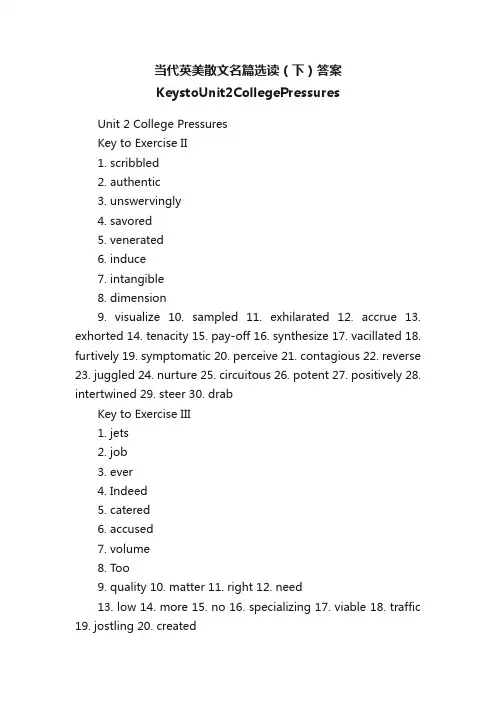
当代英美散文名篇选读(下)答案KeystoUnit2CollegePressuresUnit 2 College PressuresKey to Exercise II1. scribbled2. authentic3. unswervingly4. savored5. venerated6. induce7. intangible8. dimension9. visualize 10. sampled 11. exhilarated 12. accrue 13. exhorted 14. tenacity 15. pay-off 16. synthesize 17. vacillated 18. furtively 19. symptomatic 20. perceive 21. contagious 22. reverse 23. juggled 24. nurture 25. circuitous 26. potent 27. positively 28. intertwined 29. steer 30. drabKey to Exercise III1. jets2. job3. ever4. Indeed5. catered6. accused7. volume8. Too9. quality 10. matter 11. right 12. need13. low 14. more 15. no 16. specializing 17. viable 18. traffic 19. jostling 20. created21. result 22. some 23. hovering 24. background 25. business 26. invested 27. apart 28. list29. time 30. In-flight 31. attention 32. lure33. accent 34. Regular 35. room 36. offered37. it 38. snatch 39. proved 40. aircraft41. improve 42. are 43. inevitable 44. bearable45. there 46. to 47. process 48. passengers 49. attract 50. themselves 51. change 52. traveller53. flight 54. practice 55. businessmen 56. one57. thwart 58. passengers 59. But 60. airKey to Exercise IVA lot of the mental anguish of decision making 1 ?comes because we often worry in ∧ factual vacuum. An 2 a endless number of stewing can be avoided if we do 3 amount what all good executives ∧ with a problem that can't 4 dobe settled: return it back for more data. A famous 5 send university dean once said, "If I have a problem ∧ has 6 that to be faced at 3 o'clock next Tuesday, I refuse to 7 ?make a decision about it when Tuesday arrives. In the 8 until meantime I concentrate on getting all the facts 9 ?that bear ∧ the proble m. And by Tuesday, if I've got 10 on all the facts, the problem usually solves by itself. 11 by But just gathering the facts won't solve hard 12 the problems. "The problem in coming up to a firm and 13 upclear-sighted decision," said and old veteran infantry 14 old commander and now commandant of the National War 15 ?College, "is not only ∧ take possession of facts, but 16 to∧ marshal them in good order. In the army, we train 17 toour leaders to draw up ∧ we call an Estimate of the 18 what Situation. At first, they must know their objective. 19 At Exceptyou know what you want, you can't possibly 20 unless decide how to get it. Second, we teach them to consider 21 ?alternate means of attaining that objective. 22 alternative Very rarely that a goal, military or any other, can 23 thatbe realized in only one way. Next we line up ∧ pros 24 theand cons of each alternative, as far as we can see ∧. 25 them Then we choose the cause that appears most likely to 26 course achieve the results we want. Furthermore that does 27 Furthermore not guarantee success. But at least it allows us to 28 ?decide as intelligent as the situation permits. It 29 intelligently prevents us from going of on a half-baked hunch that 30 offmay turn out to be disastrous.Key to Exercise V1.I was really up the creek when I went into the department store and found that I had no money with me.2.Goods were piling up at the docks because the workers had gone on strike against terrible working conditions.3.As a member of the Secretariat of the Central Committee of the Workers' Party, Huang was privy to many top state secrets.4.People want their wages to catch up with the price hike.5.Dialectical materialism and historical materialism can help us see things in perspective.6. He asked the barber to thin out his thick hair.7.In accordance with the requirements of a market economy, the State Council cutback on the number of departments directly involved in economic management. 8.In his first speech at the Legislative Council the Chief Executive made much ofthe role of high technology in economic development.9.I cannot conceive of a blind man working as a radio sports commentator.10.He should have retired long ago. Why does he still hang on to power?。
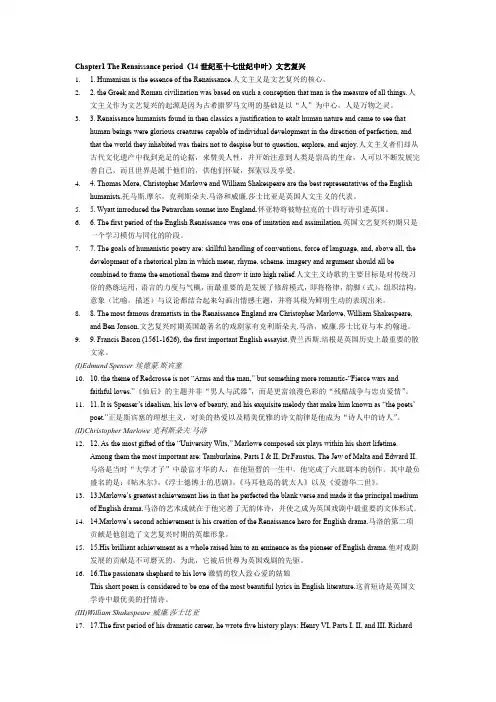
Chapter1 The Renaissance period(14世纪至十七世纪中叶)文艺复兴1. 1.Humanism is the essence of the Renaissance.人文主义是文艺复兴的核心。
2. 2.the Greek and Roman civilization was based on such a conception that man is the measure of all things.人文主义作为文艺复兴的起源是因为古希腊罗马文明的基础是以“人”为中心,人是万物之灵。
3. 3.Renaissance humanists found in then classics a justification to exalt human nature and came to see thathuman beings were glorious creatures capable of individual development in the direction of perfection, and that the world they inhabited was theirs not to despise but to question, explore, and enjoy.人文主义者们却从古代文化遗产中找到充足的论据,来赞美人性,并开始注意到人类是崇高的生命,人可以不断发展完善自己,而且世界是属于他们的,供他们怀疑,探索以及享受。
4. 4.Thomas More, Christopher Marlowe and William Shakespeare are the best representatives of the Englishhumanists.托马斯.摩尔,克利斯朵夫.马洛和威廉.莎士比亚是英国人文主义的代表。
5. 5.Wyatt introduced the Petrarchan sonnet into England.怀亚特将彼特拉克的十四行诗引进英国。
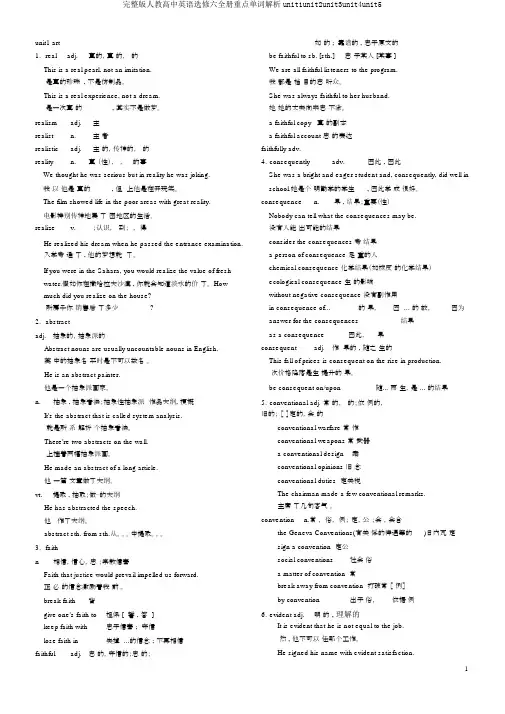
unit1 art1. real adj.真的,真的,的This is a real pearl, not an imitation.是真的珍珠 , 不是仿制品。
This is a real experience, not a dream.是一次真的, 其实不是做梦。
realism adj.主realist n.主者realistic adj.主的,传神的,的reality n.真(性),,的事We thought he was serious but in reality he was joking.我以他是真的, 但上他是在开玩笑。
The film showed life in the poor areas with great reality.电影特别传神地展了困地区的生活。
realize v.;认识,到;,得He realized his dream when he passed the entrance examination.入学考通了 , 他的梦想就了。
If you were in the Sahara, you would realize the value of fresh water.假如你在撒哈拉大沙漠 , 你就会知道淡水的价了。
Howmuch did you realize on the house?所房子你销售后了多少?2. abstractadj.抽象的,抽象派的Abstract nouns are usually uncountable nouns in English.英中的抽象名平时是不可以数名。
He is an abstract painter.他是一个抽象派画家。
n.抽象 , 抽象看法;抽象性抽象派作品大纲, 梗概It's the abstract that is called system analysis.就是所系解析个抽象看法。
There're two abstracts on the wall.上挂着两幅抽象派画。
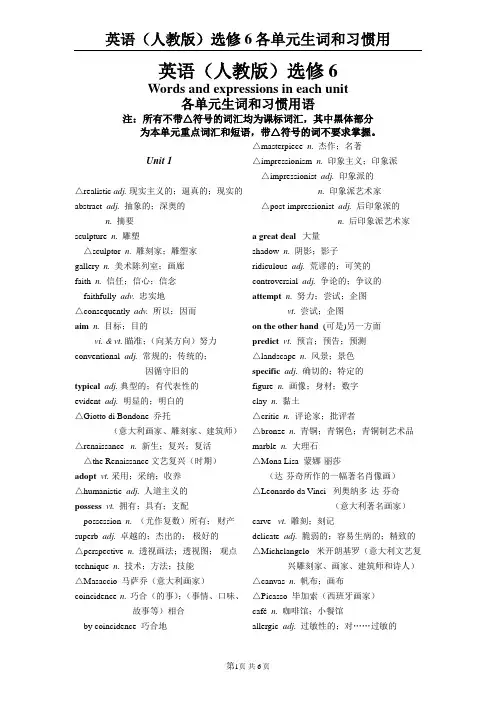
英语(人教版)选修6Words and expressions in each unit各单元生词和习惯用语注:所有不带△符号的词汇均为课标词汇,其中黑体部分为本单元重点词汇和短语,带△符号的词不要求掌握。
Unit 1△realistic adj. 现实主义的;逼真的;现实的abstract adj. 抽象的;深奥的n. 摘要sculpture n. 雕塑△sculptor n. 雕刻家;雕塑家gallery n. 美术陈列室;画廊faith n. 信任;信心;信念faithfully adv. 忠实地△consequently adv. 所以;因而aim n. 目标;目的vi. & vt. 瞄准;(向某方向)努力conventional adj. 常规的;传统的;因循守旧的typical adj. 典型的;有代表性的evident adj. 明显的;明白的△Giotto di Bondone 乔托(意大利画家、雕刻家、建筑师)△renaissance n. 新生;复兴;复活△the Renaissance 文艺复兴(时期)adopt vt. 采用;采纳;收养△humanistic adj. 人道主义的possess vt. 拥有;具有;支配possession n. (尤作复数)所有;财产superb adj. 卓越的;杰出的;极好的△perspective n. 透视画法;透视图;观点technique n. 技术;方法;技能△Masaccio 马萨乔(意大利画家)coincidence n. 巧合(的事);(事情、口味、故事等)相合by coincidence 巧合地△masterpiece n. 杰作;名著△impressionism n. 印象主义;印象派△impressionist adj. 印象派的n. 印象派艺术家△post-impressionist adj. 后印象派的n. 后印象派艺术家a great deal 大量shadow n. 阴影;影子ridiculous adj. 荒谬的;可笑的controversial adj. 争论的;争议的attempt n. 努力;尝试;企图vt. 尝试;企图on the other hand (可是)另一方面predict vt. 预言;预告;预测△landscape n. 风景;景色specific adj. 确切的;特定的figure n. 画像;身材;数字clay n. 黏土△critic n. 评论家;批评者△bronze n. 青铜;青铜色;青铜制艺术品marble n. 大理石△Mona Lisa 蒙娜·丽莎(达·芬奇所作的一幅著名肖像画)△Leonardo da Vinci 列奥纳多·达·芬奇(意大利著名画家)carve vt. 雕刻;刻记delicate adj. 脆弱的;容易生病的;精致的△Michelangelo 米开朗基罗(意大利文艺复兴雕刻家、画家、建筑师和诗人)△canvas n. 帆布;画布△Picasso 毕加索(西班牙画家)cafén. 咖啡馆;小餐馆allergic adj. 过敏性的;对……过敏的△effectively adv. 有效地exhibition n. 展览;陈列;展览会aggressive adj. 敢作敢为的;侵略的;好斗的scholar n. 学者flesh n. 肉;肌肉;肉体in the flesh 活着的;本人△Matisse 马蒂斯(法国画家)geometry n. 几何学bunch n. 束;串△Manhattan n. 曼哈顿岛;曼哈顿区(纽约市中心)avenue n. 林荫道;道路;大街preference n. 喜爱;偏爱△Guggenheim Museum 古根海姆博物馆△display vt. 展示;陈列;显露appeal vi. 有感染力;呼吁;求助vt. 将……上诉n. 呼吁;恳求appeal to (对某人)有吸引力;(使某人)感兴趣fragile adj. 精细的;易碎的;脆弱的△circular adj. 圆形的;环形的;循环的△metropolitan adj. 主要都市的;大城市的reputation n. 名声;名誉civilization n. 文明;文化;文明社会Egypt n. 埃及(东北非国家)Egyptian adj. 埃及的;埃及人的visual adj. 视觉的;看得见的fragrant adj. 香的;令人愉快的△Monet 莫奈(法国画家)△Whitney 惠特尼△Madison n. 麦迪逊contemporary adj. 当代的;同时代的permanent adj. 永久的;持久的district n. 区;区域;行政区committee n. 委员会signature n. 署名;签字Unit 2△poetry n. 诗(总称);诗意tick vt. 给……标记号rhyme n. 韵;押韵;押韵的词vi. & vt. (使)押韵convey vt. 传达;运送△emotion n. 情感;情结;感情nursery n. 托儿所nursery rhyme 童谣concrete adj. 具体的△repetition n. 重复;反复;循环contradictory adj. 引起矛盾的;好反驳的△hush vi. &vt. (使某人)安静下来△mockingbird n. 嘲鸫(一种鸟,能模仿其他鸟的叫声)diamond n. 钻石;菱形△brass n. 黄铜;黄铜器△billy-goat n. 公山羊flexible adj. 灵活的;可弯曲的;柔顺的pattern n. 模式;式样;图案△squire n. 乡绅cottage n. 村舍;小屋△coffin n. 棺材sparrow n. 麻雀△kitten n. 小猫take it easy 轻松;不紧张;从容run out of 用完△cinquain n. 五行诗be made up of 由……构成tease vi. & vt. 取笑;招惹;戏弄salty adj. 含盐的;咸的△droop vi. 低垂;凋萎;萎靡△dread vi. & vt. 害怕;畏惧endless adj. 无穷的;无止境的△haiku n. 俳句△syllable n. 音节minimum n. 最低限度;最少量最小数translation n. 翻译;译文branch n. 枝条;支流;部门△melt (melted; melted, molten)vi. 融化;溶化;软化△brimful adj. 盈满的;满到边际的in particular 尤其;特别eventually adv. 最后;终于△await vt. 等候;期待transform vi. & vt. 转化;转换;改造;变换△revolve vi. & vt. (使)旋转△utter vt. 说;讲;发出(声音)sorrow n. 悲伤;悲痛;懊悔bare adj. 赤裸的;光秃的;稀少的n. 最基本的要素librarian n. 图书馆馆长;图书馆管理员forever adv. 永远△stem n. 茎;干△cement n. 水泥section n. 部分;节;切下的块appropriate adj. 适当的;正当的exchange n. 交换;交流;互换vt. & vi. 调换;交换diploma n. 毕业文凭;学位证书sponsor n. 赞助人;主办者;倡议者vt. 发起;举办;倡议blank n. 空白adj. 空白的;茫然的compass n. 指南针;罗盘;(复数)圆规bride n. 新娘bridegroom n. 新郎championship n. 冠军称号△rhythmic adj. 有节奏的;有规律的darkness n. 黑暗;漆黑warmth n. 暖和;温暖try out 测试;试验scholarship n. 奖学金;学问;学术成就pianist n. 钢琴家;钢琴演奏者violinist n. 小提琴演奏者let out 发出;放走load n. 负担;负荷物(尤指沉重的)Unit 3cigarette n. 香烟;纸烟alcohol n. 酒;酒精alcoholic adj. 酒精的abuse n. & vt. 滥用;虐待△fitness n. 健康△sexual adj. 性的;性别的stress n. 压力;重音vt. 加压力于;使紧张△stressful adj. 产生压力的;紧张的△obesity n. (过度)肥胖;肥胖症adolescent n. 青少年adj. 青春期的adolescence n. 青春期ban vt. 禁止;取缔n. 禁令;谴责due adj. 欠款的;预定的;到期的due to 由于……tough adj. 困难的;强硬的addicted adj. 入了迷的;上了瘾的addicted to 对……有瘾△nicotine n. 尼古丁accustom vt. 使习惯于accustomed adj. 惯常的;习惯了的accustomed to 习惯于……withdrawal n. 收回;撤退;戒毒(或脱瘾)过程△bad-tempered adj. 脾气暴躁的;易怒的automatic adj. 无意识的;自动的automatically adv. 无意识地;自动地mental adj. 精神的;智力的mentally adv. 精神上;智力上quit vt. 停止(做某事);离开effect n. 结果;效力lung n. 肺pregnant adj. 怀孕的abnormal adj. 畸形的;异常的breathless adj. 气喘吁吁的;屏息的unfit adj. 不健康的;不合适的;不合格的strengthen vt. 加强;巩固;使坚强vi. 变强△resolve n. 决心;决定decide on 对……作出决定packet n. 小包;小盒feel like (doing) 想要(做)……△relaxation n. 放松,松弛desperate adj.绝望的,拼命的chemist n.药剂师;化学家△gum n. 树胶△chewing gum 口香糖disappointed adj. 失望的;沮丧的△weaken vi. (对某事的决心)动摇;减弱vt. (使)变弱ashamed adj. 感到惭愧或羞耻的comprehension n. 理解(力)in spite of 不顾;不管take risks (a risk) 冒险get into 陷入;染上(坏习惯)etc (et cetera) adv. 诸如此类的事物;等等appendix(复数-dixes, -dices)n. 附录;附件illegal adj. 不合法的;违法的pill n. 药丸;药片△robbery n. 抢劫;盗窃△slippery adj. 滑的△HIV (Human Immunodeficiency Virus)人体免疫缺损病毒(艾滋病病毒)△AIDS(Acquired Immune Deficiency Syndrome)艾滋病(后天免疫缺损综合症)at risk 处境危险;遭受危险△SARS(Severe Acute Respiratory Syndrome)非典型性肺炎△immune adj. 有免疫力的survival n. 幸存;幸存者sex n. 性;性别△fluid n. 液体;流体△inject vt. 注射△injection n. 注射;注射剂needle n. 针;(注射器的)针头△spill (spilt, spilt)vi. 溢出;酒落vt. 使溢出;使酒落male adj. 男性的;雄性的n. 男人;雄性动(植)物female adj. 女性的;雌性的n. 雌性的动(植)物;女人△condom n. 避孕套△homosexual n. 同性恋adj. 同性恋的prejudice n. 偏见;成见judgement n. 看法;判决;判断△disco n. 迪斯科舞会;迪斯科舞厅abortion n. 流产;中途失败cigar n. 雪茄烟embarrassed adj. 尴尬的;陷入困境的awkward adj. 局促不安的;笨拙的Unit 4consume vt. 消费;消耗;耗尽;吃完△renewable adj. 能再生的;可更新的△greenhouse n. 温室;花房△Fahrenheit adj. 华氏的n. 华氏温度计come about 发生;造成△Sophie 索菲(女名)△Armstrong 阿姆斯特朗(姓)graph n. 图表;坐标图;曲线图random adj. 胡乱的;任意的phenomenon (复数-ena) n. 现象subscribe vi. 同意;捐赠;订阅vt. (签署)文件;捐助subscribe to 同意;赞成;订购△fossil n.化石;从地下采掘出来的(矿物)fuel n. 燃料△byproduct n. 副产品△Janice 贾尼丝(女名)△Foster 福斯特(姓或男名)△methane n. 甲烷;沼气△Celsius adj. (温度)摄氏的quantity n. 量;数量quantities of 大量的tend vi. 趋向;易于;照顾vt. 照顾;护理go up 上升;增长;升起△Charles Keeling 查尔斯·基林△measurement n. 衡量;测量;尺寸per prep. 每;每一data n. 资料;数据result in 导致trend n. 趋势;倾向;走向catastrophe n. 大灾难;浩劫flood n. 洪水;水灾△drought n. 旱灾;干旱△famine n. 饱荒△George Hambley 乔治·汗布利oppose vt. 反对;反抗;与(某人)较量opposed adj. 反对的;对立的be opposed to 反对……mild adj. 温和的;温柔的;淡的△environmental adj. 环境的△environmentalist n. 环境保护论者consequence n. 结果;后果;影响state vt. 陈述;说明range n. 种类;范围even if 即使keep on 继续glance vi. 看一下;扫视n. 一瞥steady adj. 平稳的;持续的;稳固的steadily adv. 平稳地;持续地tendency n. 倾向;趋势widespread adj. 分布广的;普遍的on the whold 大体上;基本上△economical adj. 节约的;经济的△hectare n. 公顷average adj. 平均的existence n. 生存;存在outer adj. 外部的;外面的on behalf of 代表……一方;作为……的代言人△individual n. 个人;个体adj. 单独的;个别的advocate vt. 拥护;提倡;主张commitment n. 承诺;交托;信奉put up with 忍受;容忍pollution n. 污染;弄脏growth n. 增长;生长electrical adj. 电的;与电有关的△appliance n. 用具;工具;器具so long as 只要casual adj. 随便的;漫不经心的;偶然的and so on 等等motor n. 发动机can n. 容器;罐头circumstance n. 环境;情况microwave n. 微波炉;微波refresh vt. 使恢复;使振动educator n. 教育工作者;教育家contribution n. 贡献△imperative n. 祈使语气;命令△heading n. 标题△slogan n. 标语;口号presentation n. 显示;演出nuclear adj. 核的;核能的;原子核的disagreement n. 分歧;不一致Unit 5diagram n. 图解;图表;示意图volcano n. 火山△volcanic adj. 火山的△volcanology n. 火山学△volcanologist n. 火山学家erupt vi. (指火山)爆发;突然发生eruption n. 火山爆发;(战争等)爆发ash n. 灰;灰末△crater n. 火山口;弹坑△lava n. (火山喷出的)熔岩;火山岩hurricane n. 飓风;风暴questionnaire n. 问卷;调查表alongside adv. 在旁边;沿着边prep. 在……旁边;沿着……的边equipment n. 设备;装备appoint vt. 任命;委派△observatory n. 观象台;天文台;气象台database n. 数据库;资料库△Mount Kilauea 基拉韦厄火山evaluate vt. 评估;评价;估计burn to the ground 全部焚毁wave n. 波浪;波涛vi. 波动;起伏;挥手△molten adj. 熔化的;熔融的fountain vi. & vt. 泉水般地喷出或涌出n. 喷泉;源泉absolute adj. 绝对的;完全的absolutely adv. 绝对地;完全地△spaceman n. 宇航员;航天专家suit n. 一套外衣;套装vt. 适合;使适宜helmet n. 头盔boot n. 靴子make one’s way 前往potential n. 潜在性;可能性;潜能adj. 可能的;潜在的actual adj. 实在的;实际的△geology n. 地质学△Mount Etna 埃特纳火山(意大利西西里岛东北部)△Sicily 西西里岛(意大利南部)△sample n. 样品;样本candidate n. 候选人;候补者△Mount Vesuvius 维苏威火山△threat n. 恐吓;威胁bungalow n. 平房;小屋△Pompeii 庞培(意大利古都)△tornado n. 龙卷风;旋风typhoon n. 台风thunderstorm n. 雷暴precious adj. 贵重的;珍贵的novelist n. 小说家fog n. 雾document n. 文件;证件rainbow n. 彩虹uncomfortable adj. 不舒服的;不舒适的balcony n. 阳台unconscious adj. 失去知觉的;未察觉的shoot (shot, shot)vt. 射中;射伤shot n. 射击;枪炮声tremble vi. 摇晃;摇动;颤抖sweat n. 汗vi. 出汗anxious adj. 忧虑的;不安的anxiety n. 担心;焦虑;渴望panic (panicked, panicked) vi. & vt. 惊慌n. 惊慌;恐慌△tsunami n. 海啸;地震海啸glance through 匆匆看一遍△Manchu adj. 满族的n. 满人vary from…to… 由……到……不等diverse adj. 多种多样的;不同的△diversity n. 多种多样;多样性△crane n. 鹤;吊车;起重机△leopard n. 豹△spectacular adj. 引人入胜的;壮观的bathe vi. 洗澡;游泳△arouse vt. 激发;唤醒某人appreciation n. 欣赏;感激;感谢△peak n. 山顶;顶峰△persuasion n. 信服;说服guarantee vt. 保证;担保。
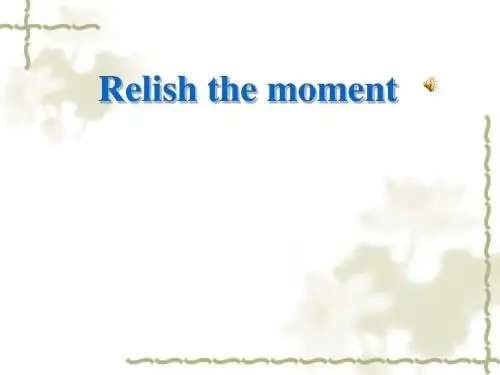
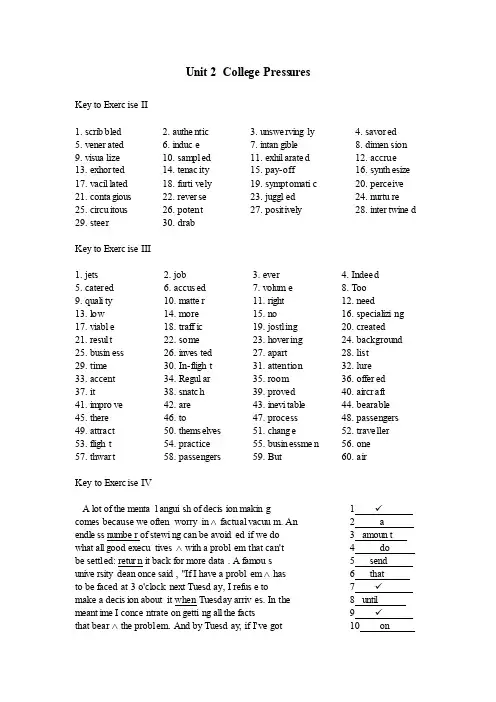
Unit 2 Colleg e Pressu resKey to Exerci se II1. scribb led2. authen tic3. unswer vingl y4. savore d5. venera ted6. induce7. intang ible8. dimens ion9. visual ize 10. sample d 11. exhila rated12. accrue 13. exhort ed 14. tenaci ty 15. pay-off 16. synthe size17. vacill ated18. furtiv ely 19. sympto matic20. percei ve 21. contag ious22. revers e 23. juggle d 24. nurtur e 25. circui tous26. potent27. positi vely28. intert wined 29. steer30. drabKey to Exerci se III1. jets2. job3. ever4. Indeed5. catere d6. accuse d7. volume8. Too9. qualit y 10. matter11. right12. need13. low 14. more 15. no 16. specia lizin g 17. viable18. traffi c 19. jostli ng 20. create d21. result22. some 23. hoveri ng 24. backgr ound25. busine ss 26. invest ed 27. apart28. list29. time 30. In-flight31. attent ion 32. lure33. accent34. Regula r 35. room 36. offere d37. it 38. snatch39. proved40. aircra ft41. improv e 42. are 43. inevit able44. bearab le 45. there46. to 47. proces s 48. passen gers49. attrac t 50. themse lves51. change52. travel ler 53. flight54. practi ce 55. busine ssmen56. one57. thwart58. passen gers59. But 60. airKey to Exerci se IVA lot of the mental anguis h of decisi on making 1 ✓comesbecaus e we oftenworryin ∧ factua l vacuum. An 2 a endles s number of stewin g can be avoide d if we do 3 amount what all good execut ives∧ with a proble m that can't 4 dobe settle d: return it back for more data. A famous 5 send univer sitydean once said, "If I have a proble m ∧ has 6 thatto be facedat 3 o'clocknext Tuesda y, I refuse to 7 ✓make a decisi on aboutit when Tuesda y arrive s. In the 8 untilmeanti me I concen trate on gettin g all the facts9 ✓that bear ∧ the proble m. And by Tuesda y, if I've got 10 onall the facts, the proble m usuall y solves by itself. 11 byBut just gather ing the factswon't solvehard 12 theproble ms. "The proble m in coming up to a firm and 13 upclear-sighte d decisi on," said and old vetera n infant ry 14 old comman der and now comman dantof the Nation al War 15 ✓Colleg e, "is not only ∧ take posses sionof facts, but 16 to∧ marsha l them in good order. In the army, we train17 toour leader s to draw up ∧ we call an Estima te of the 18 what Situat ion. At first, they must know theirobject ive. 19 At Except you know what you want, you can't possib ly 20 unlessdecide how to get it. Second, we teachthem to consid er 21 ✓altern ate meansof attain ing that object ive. 22 altern ative Very rarely that a goal, milita ry or any other, can 23 thatbe realiz ed in only one way. Next we line up ∧ pros 24 theand cons of each altern ative, as far as we can see ∧. 25 them Then we choose the causethat appear s most likely to 26 course achiev e the result s we want. Furthe rmore that does 27 Furthe rmore not guaran tee succes s. But at leastit allows us to 28 ✓decide as intell igent as the situat ion permit s. It 29 intell igent ly preven ts us from goingof on a half-bakedhunchthat 30 offmay turn out to be disast rous.Key to Exerci se V1.I was really up the creekwhen I went into the depart mentstoreand foundthat I had no moneywith me.2.Goodswere piling up at the docksbecaus e the worker s had gone on strike agains t terrib le workin g condit ions.3.As a member of the Secret ariat of the Centra l Commit tee of the Worker s' Party, Huangwas privyto many top statesecret s.4.People want theirwagesto catchup with the pricehike.5.Dialec tical materi alism and histor icalmateri alism can help us see things in perspe ctive.6. He askedthe barber to thin out his thickhair.7.In accord ancewith the requir ement s of a market econom y, the StateCounci l cutback on the number of depart ments direct ly involv ed in econom ic manage ment. 8.In his firstspeech at the Legisl ative Counci l the ChiefExecut ive made much ofthe role of high techno logyin econom ic develo pment.9.I cannot concei ve of a blindman workin g as a radiosports commen tator.10.He should have retire d long ago. Why does he stillhang on to power?。
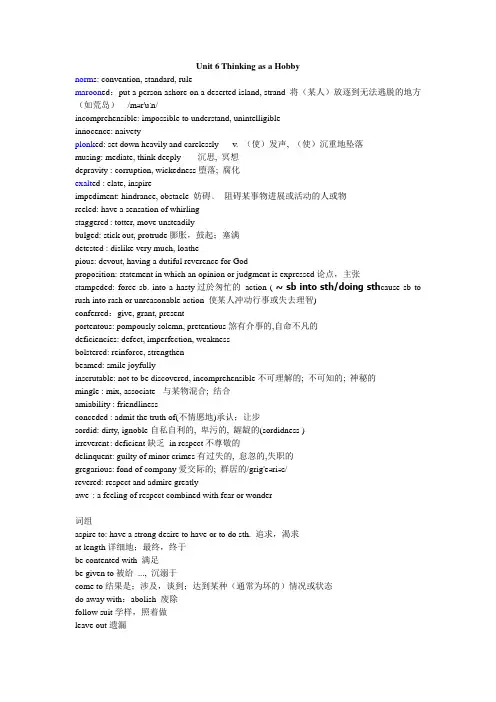
Unit 6 Thinking as a Hobbynorm s: convention, standard, rulemaroon ed:put a person ashore on a deserted island, strand 将(某人)放逐到无法逃脱的地方(如荒岛)/mər'uːn/incomprehensible: impossible to understand, unintelligibleinnocence: naivetyplonk ed: set down heavily and carelessly v. (使)发声, (使)沉重地坠落musing: mediate, think deeply 沉思, 冥想depravity : corruption, wickedness堕落; 腐化exalt ed : elate, inspireimpediment: hindrance, obstacle 妨碍﹑阻碍某事物进展或活动的人或物reeled: have a sensation of whirlingstaggered : totter, move unsteadilybulged: stick out, protrude膨胀,鼓起;塞满detested : dislike very much, loathepious: devout, having a dutiful reverence for Godproposition: statement in which an opinion or judgment is expressed论点,主张stampeded: force sb. into a hasty过於匆忙的action ( ~ sb into sth/doing sth cause sb to rush into rash or unreasonable action 使某人冲动行事或失去理智)conferred:give, grant, presentportentous: pompously solemn, pretentious煞有介事的,自命不凡的deficiencies: defect, imperfection, weaknessbolstered: reinforce, strengthenbeamed: smile joyfullyinscrutable: not to be discovered, incomprehensible不可理解的; 不可知的; 神秘的mingle : mix, associate 与某物混合; 结合amiability : friendlinessconceded : admit the truth of(不情愿地)承认;让步sordid: dirty, ignoble自私自利的, 卑污的, 龌龊的(sordidness )irreverent : deficient缺乏in respect不尊敬的delinquent: guilty of minor crimes有过失的, 怠忽的,失职的gregarious: fond of company爱交际的; 群居的/grig'eəriəs/revered: respect and admire greatlyawe : a feeling of respect combined with fear or wonder词组aspire to: have a strong desire to have or to do sth. 追求,渴求at length详细地;最终,终于be contented with 满足be given to被给..., 沉溺于come to结果是;涉及,谈到;达到某种(通常为坏的)情况或状态do away with:abolish 废除follow suit学样,照着做leave out遗漏if anything如果有什么区别的话lest唯恐,以免make for有助于,促进Unit 7 Once More to the Lake1.hovering: remain in the air without moving in any direction 翱翔;盘旋;徘徊2.haunts: a place one visits often3.sprinkled: scattered, dotted4.mirage: illusion, dream 海市蜃楼5.ingredients : factor6.winced: drack from something unpleasant,remembered something unpleasant表示痛苦﹑沮丧或尴尬(以不由自主的轻微动作表现, 尤指面部肌肉)7.undulating: having a curving form or outline8.jarred: have a harsh or irritating effect 发出刺耳声,(使)感到不快,刺激;震动9.apiece: each, for each10.persisted: last tenaciously(坚韧不拔地)11.dislodged: force out of a position逐出12. pensively: meditatively, sadly13. cultist : devotee个人崇拜,献身于致力于做某事的人14. indelible: that cannot be erased or removed 不能擦除的, 不能磨灭15. haul: distance to be traveled移动的距离16. petulant: unreasonably impatient or irritable性急的; 暴躁的17. imperceptibly: in a manner that cannot be noticed or felt18. desolated: devastate, destroy, ruin19. perpetuate: make everlasting20. lull: a period of quiet or little activity间歇; 稍息; 稍止21. rumble: a deep heavy continuous sound发出持续的低沉的声音22. placidity: calm, tranquility23. reassured: take away fears, set one's mind at rest24. sedative: tranquilizer镇静剂/s'edətiv/25. incessant: constant, ceaseless26. soggy: too wet and soft词组leave to one's own devices听任…自便,让…自行发展roll over翻滚lick one's chops: show eager enjoyment or anticipation of sth 舔嘴唇(自喜或期待某事);垂涎欲滴, 垂涎三尺narrow down减少, 限制, 缩小, 变窄outside of : apart from 除....以外turn away 回绝,把…打发走crop up突然发生,突然出现make out看出,辨认出;理解draw up停住have sb. eating out of one's hand: 完全控制(to eat out of one's hand:to be docile容易控制的, 驯服的or do whatever one wishes顺从)Unit 8 The Inner Ringimploringly: in a manner showing earnest pleading恳求地, 哀求地spontaneous: natural, activated without deliberation 自发地devoured : filled up withseniority: length of service前任者的特权, 老资格compromised : discredit怀疑,丧失名誉, endanger危及Sandwiched: placed betweenunscrupulous : not guided by conscience, unprincipled无道德原则的; 不讲道德的perverse: willfully doing what is wrong or unreasonable 不合常情的,任性的unawares :adv. by surprise 出其不意地consorting: have associations with 与某人交往; 结交propitiate : gain the favor or support of 讨好,劝慰Prompted: induce, cause to domainspring: chief motivating/ moving forcemakings: clear ability for becoming 要素genial: having a cheerful and friendly character or manner 亲切的esoteric: concealed, confidential, secret只有内行才懂的; 神秘的; 难懂的prophecy : predictionservitude : the condition of being forced to work for others and having no freedom奴役servility: the quality of being too ready to obey others, submissiveness 奴性, 卑躬屈膝pell-mell: in a hurrying disorderly manner adv. 匆忙地; 杂乱地; 仓促地hierarchy : system with grades of authority from the lowest to the highestprobation : testing of a person's abilities or behavior to find out if he or she is suitable(对人的)试用(期)reprimands: rebuke, reproach, scoldingevasion: avoidance逃避pining: long for, yearn for渴望lured: entice, attractcourt: try to win or gain设法赢得或获得(某事物)stale s: become no longer fresh or interestingwakeful: unable to sleep, sleeplesstrivialities: petty, unimportant thing [trivi'æliti]词组in the know 知道内情,熟知内幕do justice to 公平地对待,公正地评判work up: bring gradually to an efficient state 逐渐形成account for解释,说明coincide with符合, 与 ... 一致of one's own accord出于自愿,主动地wear off 逐渐消失shake off: get rid of摆脱, 甩掉immune to不受... 感染, 对... 免疫apt to: tend to。
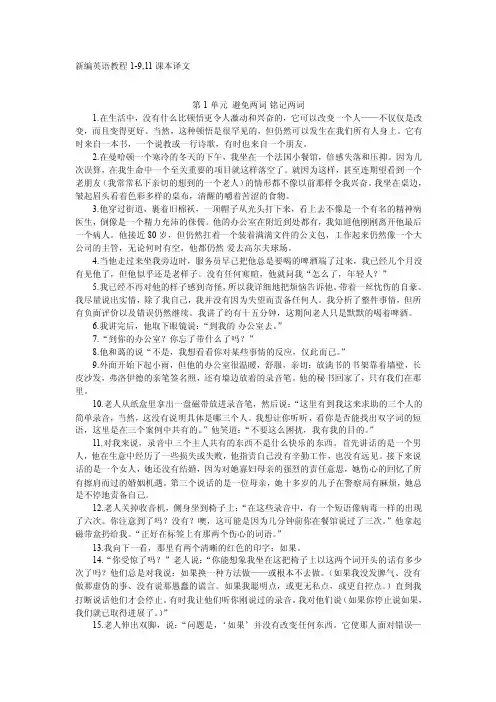
新编英语教程1-9,11课本译文第1单元避免两词铭记两词1.在生活中,没有什么比顿悟更令人激动和兴奋的,它可以改变一个人——不仅仅是改变,而且变得更好。
当然,这种顿悟是很罕见的,但仍然可以发生在我们所有人身上。
它有时来自一本书,一个说教或一行诗歌,有时也来自一个朋友。
2.在曼哈顿一个寒冷的冬天的下午,我坐在一个法国小餐馆,倍感失落和压抑。
因为几次误算,在我生命中一个至关重要的项目就这样落空了。
就因为这样,甚至连期望看到一个老朋友(我常常私下亲切的想到的一个老人)的情形都不像以前那样令我兴奋。
我坐在桌边,皱起眉头看着色彩多样的桌布,清醒的嚼着苦涩的食物。
3.他穿过街道,裹着旧棉袄,一顶帽子从光头打下来,看上去不像是一个有名的精神病医生,倒像是一个精力充沛的侏儒。
他的办公室在附近到处都有,我知道他刚刚离开他最后一个病人。
他接近80岁,但仍然扛着一个装着满满文件的公文包,工作起来仍然像一个大公司的主管,无论何时有空,他都仍然爱去高尔夫球场。
4.当他走过来坐我旁边时,服务员早已把他总是要喝的啤酒端了过来,我已经几个月没有见他了,但他似乎还是老样子。
没有任何寒暄,他就问我“怎么了,年轻人?”5.我已经不再对他的样子感到奇怪,所以我详细地把烦恼告诉他。
带着一丝忧伤的自豪。
我尽量说出实情,除了我自己,我并没有因为失望而责备任何人。
我分析了整件事情,但所有负面评价以及错误仍然继续。
我讲了约有十五分钟,这期间老人只是默默的喝着啤酒。
6.我讲完后,他取下眼镜说:“到我的办公室去。
”7.“到你的办公室?你忘了带什么了吗?”8.他和蔼的说“不是,我想看看你对某些事情的反应,仅此而已。
”9.外面开始下起小雨,但他的办公室很温暖,舒服,亲切:放满书的书架靠着墙壁,长皮沙发,弗洛伊德的亲笔签名照,还有墙边放着的录音笔。
他的秘书回家了,只有我们在那里。
10.老人从纸盒里拿出一盘磁带放进录音笔,然后说:“这里有到我这来求助的三个人的简单录音,当然,这没有说明具体是哪三个人。
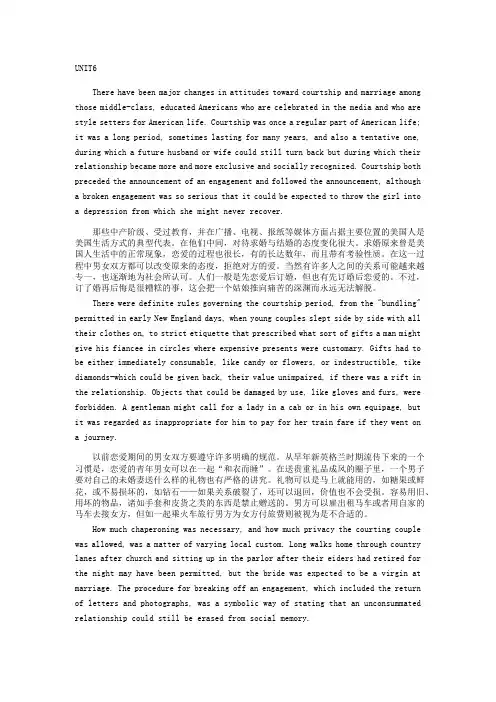
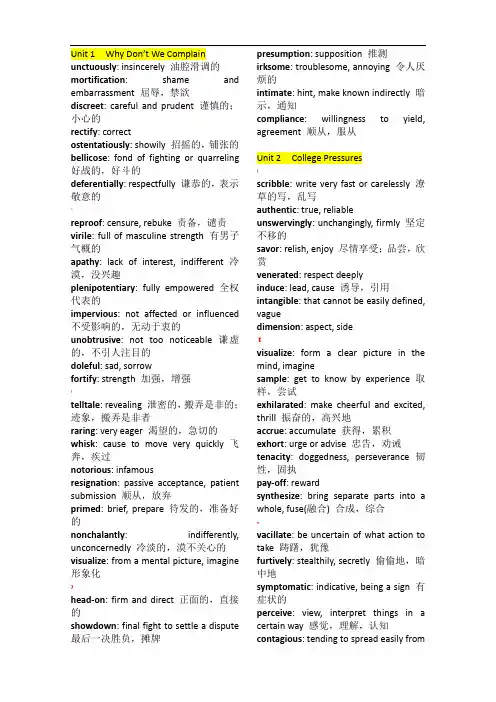
unctuously: insincerely 油腔滑调的mortification: shame and embarrassment 屈辱,禁欲discreet: careful and prudent 谨慎的;小心的rectify: correctostentatiously: showily 招摇的,铺张的bellicose: fond of fighting or quarreling 好战的,好斗的deferentially: respectfully 谦恭的,表示敬意的~reproof: censure, rebuke 责备,谴责virile: full of masculine strength 有男子气概的apathy: lack of interest, indifferent 冷漠,没兴趣plenipotentiary: fully empowered 全权代表的impervious: not affected or influenced 不受影响的,无动于衷的unobtrusive: not too noticeable 谦虚的,不引人注目的doleful: sad, sorrowfortify: strength 加强,增强!telltale: revealing 泄密的,搬弄是非的;迹象,搬弄是非者raring: very eager 渴望的,急切的whisk: cause to move very quickly 飞奔,疾过notorious: infamousresignation: passive acceptance, patient submission 顺从,放弃primed: brief, prepare 待发的,准备好的nonchalantly: indifferently, unconcernedly 冷淡的,漠不关心的visualize: from a mental picture, imagine 形象化)head-on: firm and direct 正面的,直接的showdown: final fight to settle a dispute 最后一决胜负,摊牌irksome: troublesome, annoying 令人厌烦的intimate: hint, make known indirectly 暗示,通知compliance: willingness to yield, agreement 顺从,服从Unit 2 College Pressures|scribble: write very fast or carelessly 潦草的写,乱写authentic: true, reliable unswervingly: unchangingly, firmly 坚定不移的savor: relish, enjoy 尽情享受;品尝,欣赏venerated: respect deeplyinduce: lead, cause 诱导,引用intangible: that cannot be easily defined, vaguedimension: aspect, side【visualize: form a clear picture in the mind, imaginesample: get to know by experience 取样,尝试exhilarated: make cheerful and excited, thrill 振奋的,高兴地accrue: accumulate 获得,累积exhort: urge or advise 忠告,劝诫tenacity: doggedness, perseverance 韧性,固执pay-off: rewardsynthesize: bring separate parts into a whole, fuse(融合) 合成,综合。
人教版英语选修6课文原文及课文译文Unit 1 Art 第一单元艺术ReadingA SHORT HISTORY OF WESTERN PAINTINGArt is influenced by the customs and faith of a people。
Styles in Western art have changed many times. As there are so many different styles of Western art, it would be impossible to describe all of them in such a short text。
Consequently, this text will describe only the most important ones. Starting from the sixth century AD。
The Middle Ages(5th to the 15th century AD)During the Middle Ages, the main aim of painters was to represent religious themes. A conventional artistof this period was not interested in showing nature and people as they really were。
A typical picture at this time was full of religious symbols, which created a feeling of respect and love for God。
But it was evident that ideas were changing in the 13th century when painters like Giotto di Bondone began to paint religious scenes in a more realistic way。
新编英语教程6unit9、10课文翻译Unit 9 T ext I A Red Light for Scofflaws 对藐视法律者的警告弗兰克·特里皮特法律和秩序时美国历史上最悠久的政治问题,可能也是人们最喜爱探讨的政治问题。
然而,一个显而易见令人心痛的事实是,数百万那些从来不认为自己违法,更不用说犯罪了的美国人从来不认为自己曾经违法,更不用说犯罪了;他们正越来越随便地对待旨在保护美国社会并促进其发展的法规。
这一显而易见的事实令人厌烦心痛。
虽然人们制定了法规来保护社会并促进其发展,但是上述美国人却享有了越来越多的自由。
事实上,当今社会充斥着非法乱丢垃圾、骗税、非法制造噪音和机动车秩序混乱的现象,以致于有时候藐视法律的行为有时候让人看来好像代表了未来发展的潮流。
哈佛大学的社会学家戴维·里斯曼察觉到,大部分美国人已轻率地养成了一种习惯,犯一些据称是轻微的失职,把这当成是理所当然的事情。
里斯曼他早先说,美国社会的伦理道德已经正面临着逐渐沦落为“傻子才会遵守规则”这种危险的情况境地。
支持里斯曼这一说法的证据是再明显不过的了。
藐视法律者数量众多,以各种各样的方式存在,其数目令人吃惊。
喜欢涂鸦的人把公共场所的墙面变成了视觉垃圾。
骑自行车的人经常把车骑得好像两轮得交通工具不受所有得交通法规约束一样。
喜欢习惯乱丢垃圾得人把自己得社区变成垃圾堆。
一阵一阵得法规条文虽然铺天盖地、来势汹汹,但是,却无法把高分贝得便携式收音机从公共场所清除出去,这就像正如早先得法律无法消除因啤酒引用过度而导致得困扰众多公园的流氓行为一样。
令人绝望的是,烟鬼们仍然不可救药地对“禁止吸烟”的标记熟视无睹。
穿着体面的大麻吸食者的人再在分烟卷时,也懒得麻烦,不再而劳烦自己避人耳目,巧妙地避开公众的视线。
明目张胆地使用可卡因这一丑行正在中上阶层社会人生活当中逐渐恶化愈演愈烈。
此外还有那些(哈罗,各位)乱穿马路的人。
藐视法律引起的危险程度,在不同情况下相差别很大。
人教版英语选修6课文原文及课文译文Unit 1 Art 第一单元艺术A SHORT HISTORY OF WESTERN PAINTING 西方绘画艺术简史The style s of Western art had changed many times, while Chinse art had changed less ofen.Art is influenced ['ɪnflʊəns]n. 影响;势力;感化;有影响的人或事vt. 影响;改变by the customs ['kʌstəmz]n. 海关;风俗(custom的复数);习惯;关税and faith [feɪθ]n. 信仰;信念;信任;忠实of a people. Styles [staɪlz]n. 风格;样式;模式(style的复数形式)in Western art have changed many times. As there are so many different style s of Western art, it would be impossible [ɪm'pɒsɪb(ə)l]adj. 不可能的;不可能存在的;难以忍受的;不真实的n. 不可能;不可能的事to describe all of them in such a short text [tekst]n. [计] 文本;课文;主题vt. 发短信. Consequently ['kɒnsɪkw(ə)ntlɪ]adv. 因此;结果;所以, this text will describe only the most important ones. Starting from the sixth century AD.chine [tʃaɪn] n. 脊骨;脊柱chinse [tʃins] n. 填隙;捻缝Chinese [,tʃai'ni:z] n. 中文,汉语;中国人adj. 中国的,中国人的;中国话的西方艺术风格变化较大而中国艺术风格变化较小。
使用说明1.《教师手册》包括三部分:About the Author (作者简介及课文出处等)、About the Text (难句分析、语言点、修辞等)、Keys to Exercises。
2.作者简介及难句分析和语言点的部分内容已收入教材的“注释”(Notes and Commentary),请教师在讲解前仔细核对。
3.“练习答案”只提供第二至第五部分(即词汇、完型填空、改错、中译英)习题的答案。
第一部分(Questions for Comprehension and Discussion)涉及对课文内容的分析、作者态度或立场的归纳评论、以及修辞手段的运用等,没有标准答案。
教师可以在组织学生进行讨论、辩论、角色扮演或提问时灵活处理,适当提供背景知识、相关词汇等,引导学生得出比较合理的结论。
4.中译英和英译中的答案仅供参考。
5.练习经过多次修改,恐有不少错漏。
不便之处,敬请谅解。
欢迎使用者批评指正。
编者2000年6月Unit One How T o Grow OldAbout the authorBertrand Arthur William Russell, 3d Earl, 1872-1970, British philosopher, mathematic ian, and social reformer; b. Wales. The grandson of Lord John Russell, the 1st Earl Russell, he succeeded to the earldom in 1931. While teaching at Cambridge Univ. Russell produced his most important works, Principles of Mathematics(1903) and, with Alfred North WHITEHEAD, Principia Mathenetica(3 vol., 1910 –13), in which he attempted to show how the laws of mathematics could be deduced from the basic axioms of logic. His work influenced on 20th-cent. symbolic logic, SET theory in mathematics, and LOGICAL POSITIVISM, especially in the work of his student Ludwig WITTFENSTEN. An undogmatic but zealous rationalist, Russell was deeply convinced of the logical independence of individual facts and the dependence of knowledge on the data of original experience. Well known for his social views, he was an active pacifist during World War I. In 1927 he and his wife founded the highly experimental Beacon Hill School. His liberal views on marriage, sex, adultery, and homosexuality made him controversial during most of the 1930s. He abandoned pacifism during World War II in the face of the Nazi threat but reverted to it after the war, becoming a leader in the ―ban the bomb‖ movement to halt the manufacture of nuclear weapons. In the 1960s he and Jean-Paul SARTRE organized European opposition to U.S. involvement in the Vietnam War. Russell‘s radicalism kept him from a traditional academic career, and he supported himself chiefly by his writings, many of them widely read, e.g., Marriage and Morals(1929), A History of W estern Philosophy(1945), and his autobiography (3 vol., 1967-69). In 1950 he was awarded the Nobel Prize in literature.Ressell had one of the most widely varied and persistently influential intellects of the 20th century. During most of his active life, a span of 3 generations, Russell had at any time more than 40 books in print ranging over philosophy, mathematics, science, ethics, sociology, education, history, religion, politics and polimic. The extent of his influence resulted partly from his amazing efficiency in applying his intellect (he normally wrote at the rate of 3000 largely unaltered words a day), his memory, and his aristocratic independence, and partly from his deep humanitarian feeling that was the main spring of his actions. His first major undertaking in the field of logic and mathematics had a profound influence upon philosophy in the western world. In his middle years,his books on morals, politics, education, pacifism, and other subjects were an illumination and encouragement to the rebellious layman. Finally, during the last decades of his life (just as he felt himself in danger of becoming respectable by sheer weight of years), he became an inspiration to idealistic youth throughout the world in his active opposition to the manufacture of H-bombs and to the war in V ietnam.―How to grow old‖ was taken from his book Portraits from Memory, which was published in 1956._________________________________About the textTheme of the text:How not to grow oldStructure:Para 1 IntroductionPara 2-5 The way of not getting oldParagraph 6 ConclusionPara 1In spite of the title, this article will really be on how not to grow old, … … ---- A surprising beginning? A way to attract attention? Or a kind of skill to start a passage in a most direct and straightforward way?My first advice would be to choose your ancestors carefully. ---- Can you? Please notice the tone (humorous?) in the first part of the paragraph concerned with describing his ancestors.as regards ---- (also with regard to, in regard to) a phrase indication what one is saying applies to the fact they have just mentionedAs regards the car, I put an advertisement in the paper.With regard to the gas fire, we hardly use it.My upbringing was fairly strict in regard to obedience and truthfulness.… … was cut off in the flower of his youth at the age of sixty-seven, … … ----What a metaphor! And the latter part of the sentence is even more unexpected. In the sentence, we also find the use of euphemism (= a polite word or expression that people use when they are talking about something which they or other people find unpleasant or embarrassing, such as death or sex). Some nor examples are given below:●A man is helping the police with inquires. (A suspected criminal is detained by the police andprobably under close arrest.)●A large accident (= the explosion of a nuclear power station)●Armed emergency (= a small-scale war in which large numbers of people are being killed,buildings destroyed, etc.)●under-achiever (= a school-child who is backward or merely bore form the neck upwards)●The locus of evaluation (= the classroom)●Lower ability group (= s low learners)●A member of the lower socio-economic bracket (= a poor person)●Terminal illness (= a fatal illness)cut off ---- stop something, esp. speech or the supply of electricity, gas, water, etc.If this bill is not paid within five days, your gas supply will be cut off.If you speak for too long, the chairwoman will cut you off.If you are having a phone conversation and you are cut off (=lose communicationwith the person you are speaking to), phone the operator.who was a friend of Gibbon ----usually we say ―a friend of so-and-so‘s‖. When we want to emphasize the idea that somebody is one of the friends of a famous person, then we say ―He is a friend of so-and-so.‖Gibbon ---- Gibbon, Edward, 1734—94, English historian. He is the author of The History of the Decline and Fall of the Roman Empire (6 vol., 1776—88), one of the most influential historical works of modern times. Gibbon also wrote a subtle and interesting autobiography, Memoirs of His Life and Writings (1796). He served in Parliament from 1774 to 1783.Girton College ----The first women‘s college at Cambridge University, founded in 1896.word ---- (archaic) speakrelate ---- (fml or literary) tell (a story) or describe (a series of events)She related the events of the past week to the police.He relates how at the age of 23 he was interned in a prison camp.melancholy ----unhappiness or sadness, esp. that which is felt for a long period of time andwithout any obvious reasona melancholy piece of musicmelancholy autumn daysHe is an actor who is famous for roles full of sentimental melancholy.part from ---- separate fromTo be parted from him even for two days made her sad.dismal ---- sad and without hopeThe outlook is dismal ---- no-one thinks he is going to get better.“madre snaturale” ----(Italian) Literally, an unnatural mother. The phrase means here ―What an extraordinary mother!‖her recipe ---- her way of doing thingsthe proper recipe for remaining young ----that is to keep oneself busy. {―Growing old is no more than a bad habit which a busy man has no time to form.‖ --- AndréMaurois (1885—1967), French author, critic. The Art of Living, ―The Art of Growing Old‖(1940).}still less ---- (also much less) let alone; not to mention (to make a negative statement stronger) At the age of fourteen I had never even been on a train, still less an aircraft.brevity ---- lasting only a short time; shortnessThe first of these two poems is an anguished reflection on the brevity of life.(Nor will the old people, once they manage to keep themselves busy with some wholesome things, be haunted by the thought that their days are numbered.)Para 2As regards health, I have nothing useful to say since I have little experience of illness. ---- It seems that many others have many things to say about their experience of living a long life. Y ou might try your students to see whether they happen to know any of those different ‗recipes‘ offered by different people on different newspapers, or the same newspaper at different times.on the ground ---- a phrase used to introduce the reason (cause or argument) based on a (the) fact or belief (that)An EU national could not be deported solely on the ground of his conviction.She is suing the company on the grounds of unfair dismissal.Do you have any ground for suspecting them?We have grounds to believe that you have been lying to us.He refused to answer on the grounds that she was unfairly dismissed.mostly ---- The word is used to indicate that a statement is generally true, for example, true about the majority of a group of things or people, or true most of the time.The men at the party were mostly fairly young.A rattlesnake hunts mostly at night.Para 3absorption ---- If you have an absorption in something, you are so interested in it that it takes up a lot of your time and energy.With his new appointment in 1911, his absorption shifted.Her absorption in her work ( = giving of all her attention to it ) is so great that shethinks about nothing else.I t does not do to live in memories … ---- For old people, thinking of the past will not bring them any goodness. Compare the idea with the following lines by W. B. Y eats:When you are old and gray and full of sleep,And nodding by the fire, take down this book,And slowly read, and dream of the soft lookY our eyes had once, and of their shadows deep …One‟s own past is a gradually increasing weight ---- When people are getting old, they tend to spend more time thinking of their past experiences, which will prove to be a big burden for them.If this is true it should be forgotten, and if it is forgotten it will probably not be true. ---- Self-deceiving (to plug one‘s ears while stealing a bell) is obviously not to be encouraged, but in some cases, especially for old people, it is not always unhelpful.Para 4clinging to youth ----used predicatively, the phrase means showing undue interest in one‘s children after they have grown up.(If you cling to an idea or a way of behaving you continue to believe in its value or importance, even though it may no longer be valid or useful, e.g. cling to old, inefficient method of doing things)sucking vigour from its vitality ---- When an old person wants to be young-at-heart by indulging himself in the good old days, he is simply trying to go south by driving the chariot north.callous ---- unkind or cruel; without sympathy or feeling for other peopleIt might sound callous, but I don‘t care if he‘s homeless. He is not living with me.He is so callous about it all.contemplative ----―in quiet withdrawal‖ Literally the word means ‗considering (a particular thing) for a long time in a serious and quiet way‘ (e.g. Her mood is calm and contemplative.) philanthropic ----showing generosity towards other people and in a sincere way to help them, esp. by giving money (to poor people)Few companies offer money purely as a philanthropic gesture ---- they ‗re usually aftersomething in return.… owing to the length of infancy ---- because of the fact that human being spends much more time bringing up their offspringPara 5impersonal ----not involving or relating to any particular person; not being influenced by personal feelingsThe teacher‘s criticism of the class was impersonal.She mentioned no names in her impersonal criticism of the staff.(cf. Hospitals always seem such impersonal places ( = a place lacking human warmth and interest ) ---- rows of identical beds in dull gray rooms. She has a very cold and impersonal manner.)… wisdom born of experience … ---- wisdom as a consequence of long and varied experience; ‗ born of ‘ means coming fromHe was born of a noble/wealthy family.Love is born of heart, not mind.His wish to become a doctor was born of a desire to help sick people.exercise ----If you exercise authority, rights, responsibilities, etc. you use them well and effectivelyChinese culture used to exercise considerable influence in western countries.They have no intention of exercising restraint.It is a book designed to help you exercise the right to buy your council house.concern oneself with ----give one‘s attention to something, because you think it is important The people hope that today‘s cadres concern themselves as deeply as Jiao Y ulu with thewell-being of the masses.render ---- give; provide (assistance, help)We‘ll not forget those who rendered us help in time of need.Para 6In the young there is a justification for the feeling. ---- It is reasonable and understandable if young people ‗ are oppressed by the fear of death ‘. ‗ Justification ‘ indicates ‗ a good reason or explanation for doing something ‘. e.g.We all have justification for what we do.There‘s no justification for higher rate interests.( be ) cheated ( out ) of ---- be unfairly prevented from obtaining or achieving something ( that should belong to one )He thought that he had been cheated of some of his wages by his employer.She claimed that her cousin had cheated her out of her inheritance.The French team feel the weather cheated them of their victory.whatever work it was in him to do ---- whatever work he had the ability to do.abject ---- ( of a person or behaviour ) not having any respect for yourself; not proud or brave an abject coward/beggaran abject apology/requestThis policy has turned out to be an abject failure.ignoble ---- ( esp. of behabiour ) that you should be ashamed ofan ignoble action/ideaShe is accused of playing an ignoble part in the plot.until bit by bit the walls of the ego recede ---- Until gradually a person becomes one with theuniverse.and your life becomes increasingly merged in the universal life ----毛主席也说过要把自己有限的生命投入到无限的为人民服务中去。
1.选修六Unit1 A SHORT HISTORY OF WESTERN PAINTING西方绘画艺术简史Art is influenced by the customs and faith of a people. 艺术是受着人民生活习俗和信仰的影响的。
Styles in Western art have changed many times. 西方的艺术风格经历了多次变革。
As there are so many different styles of Western art, it would be impossible to describe all of them in such a short text. 由于西方的艺术风格多种多样,在短短的一篇课文里不可能进行全面的描述。
Consequently, this text will describe only the most important ones, starting from the sixth century AD.因此,本文只谈及从公元6世纪以来最主要的几种艺术风格。
The Middle Ages (5th to the 15th century AD) 中世纪(公元5世纪到15世纪)During the Middle Ages, the main aim of painters was to represent religious themes. 在中世纪,画家的主要任务是把宗教的主题表现出来。
A conventional artist of this period was not interested in showing nature and people as they really were. 一个传统的艺术家无意于如实地展现自然和人物。
A typical picture at this time was full of religious symbols, which created a feeling of respect and love for God. 那个时期的典型的绘画充满了宗教的(象)特征,体现出了对上帝的爱戴与敬重。
人教版《英语选修6-10》(普通高中课程标准实验教科书)单元词汇、音标、词义Unit 1 《英语选修6》1. realistic /ri ?'listik/ a. 现实主义的;逼真的;现实的2. abstract /'?bstr?kt/a.抽象的;深奥的n.摘要3. sculpture /'sk?lpt?7 n.雕塑4. sculptor /'sk?lpt?/ n.雕刻家;雕塑家5. gallery /'g?l ?ri/ n. 美术陈列室;画廊6. faith /fei 0 / n.信任;信心;信念7. faithfully /'fei 0 fuli/ ad.忠实地8. con seque ntly /'k?nsikw ?n tli/ ad.所以;因而9. aim /eim/ n. 目标;目的vi.vi. 瞄准;(向某方向)努力10. conventional /k ?n'ven??il/a.常规的;传统的;因循守旧的11. typical /'tipik ?l/ a.典型的;有代表性的12. evide nt /'evid ?nt/ a.明显的;明白的Giotto di Bon do ne ['d??:tt?:dib?: n'd?: ne 】乔托(约1266?〜1337,意大利文艺复兴初期的画家、雕塑家、建筑师)13. renaissance /r?'neis?ns/ n. 新生;复兴;复活14. the Renaissanee ['r?n?scns]文艺复兴(时期)15. adopt /?'d?pt/ vt. 采用;采纳;收养16. humanistic /hju:m ?'nistik/ a. 人道主义的17. possess /'p?'zes/ vt.拥有;具有;支配18. possession /p?'ze??n/ n.所有;财产19. superb /sju:'p?:b/ a.卓越的;杰出的;极好的20. perspective /p?:'spektiv/ n. 透视画法;透视图;观点21. technique /tek'ni:k/ n. 技术;方法;技能22. Masaccio /m a'z a tt?)u/ 马萨乔23. coincidenee /k ?uin'sid ?ns/ [k???s?l(?)ns]n.巧合(的事);相合24. by coincidence 巧合地25. masterpiece /'m a st?pi:s/ n.杰作;名著26. impressionism /im'pr ???i'iz?m/ n.印象主义;印象派27. impressionist /im'pre ??iist/ a.印象派的n.印象派艺术家28. post-impressio nist a.后印象派的n.后印象派艺术家29. a great deal n.大量30. shadow /'??d ?u/ n.阴影;影子31. ridiculous /ri'dikjul ?s/ a荒谬的;可笑的32. con troversial /'k ?n tr?'v?:??/ a.争论的;争议的33. attempt /?'tempt/ n.努力;尝试;企图vt.尝试;企图34. on the other hand adv.(可是)另一方面35. predict /pri'dikt/ vt. 预言;预告;预测36. landscape /'l?ndskeip/ n. 风景;景色37. specific /spi'sifik/ a. 确切的;特定的38. figure /'fig ?/ n. 画像;身材;数字39. clay /klei/ n. 黏土40. critic /'kritik/ n. 评论家;批评者41. bronze /br?nz/ n.青铜;青铜色;青铜制艺术品42. marble /'m a bl/ n.大理石43. Mona Lisa n. 蒙娜.丽莎(达芬奇所画之著名人像画)44. Leonardo da Vinci 列奥纳多.达.芬奇45. carve /k a:v/ vt. 雕刻;刻记46. delicate /'delikit/ a. 脆弱的;容易生病的;精致的47. Michelangelo /maikl'?nd ??lou/ n. 米开朗基罗48. canvas /'k?nv ?s/ n.帆布;画布49. Picasso n.毕加索50. cafe /'k?fei, k ?'fei/ n.咖啡馆;小餐馆51. allergic /?'l?:d?ik/ adj.过敏性的,对…过敏的52. effectively /i'fektivli/ adv. 有效地53. exhibition /'eksi'bi ??n/ n.展览;陈列;展览会54. aggressive /?'gresiv/ a.敢做敢为的;侵略的;好斗的55. scholar /'sk?l?/ n.学者flesh /fle ? n.肉;肌肉;肉体56. in the flesh adv.活着的;本人57. Matisse 马蒂斯58. geometry /d?i'?mitri/ n. 几何学59. bunch /b? nt? n.束;串60. Manhattan /m?n'h?tn/ n. 曼哈顿岛;曼哈顿区61. avenue /'?vinju:/ n. 林荫道;道路;大街62. prefere nee /'pref?r? ns/ n.喜爱;偏爱63. Guggenheim Museum 古根海姆博物馆64. display /dis'plei/ vt. 展览;陈列;显露65. appeal /?pi:l/ vi.有感染力;呼吁;求助vt.将…上诉n.呼吁;恳求66. appeal to (对某人)有吸引力;(使某人)感兴趣67. fragile /'fr?d ?ail/ a.精细的;易碎的;脆弱的68. circular /'s ?:kjul ?/ a.圆形的;环形的;循环的69. metropolitan /'metr ?p?lit ?n/ a.主要都市的;大城市的70. reputation /'repju(:)'tei ??i/ n.名声;名誉71. civilization /'sivilai'zei ??n/ n.文明;文化;文明社会72. Egypt /'i:d ?ipt/ n.埃及73. Egyptian /i'd ?ip??n/ a.埃及的,埃及人的74. visual /'vizju ?l/ a. 视觉的;看得见的75. fragrant /'freigr ?nt/ adj. 香的;令人愉快的76. Monet n. 莫奈77. Whitney /'witni, 'hw-/ 惠特尼78. Madison /'m?disn/ 麦迪逊79. con temporary /k ?n'temp?r?ri/ a.当代的;同时代的80. perma nent /'p?:m?n? nt/a .永久的;持久的81. district /'distrikt/ n. 区;区域;行政区82. committee /k ?'miti/ n. 委员会83. sig nature /'sig nit ?? n.署名;签字Un it 2《英语选修6》1. poetry /'p?uitri/ n.诗;诗意tick /tik/ vt.给…标记号2. rhyme /raim/ n.韵;押韵;押韵的词vi.vt.(使)押韵3. convey /k ?n'vei/ vt.传达;运送4. emotion /i'm ?u??n/ n.情感;情绪;感情5. nursery /'n?:s?ri/ n.托儿所6. nursery rhyme 童谣7. concrete /'k?nkri:t/ a.具体的8. repetition /'repi'ti ??i/ n.重复;反复;循环9. contradictory /k ?ntr?dikt?ri/ a.引起矛盾的;好反驳的10. hush /h?? v.(使某人)安静下来11. mockingbird /'m ?ki?b?:d/ n.嘲鸫(一种鸟)12. diamond /'dai?m?nd/ n.钻石;菱形13. brass /br a s/ n.黄铜;黄铜器14. billy-goat n.公山羊15. flexible /'fleks ?bl/ a.灵活的;可弯曲的;柔顺的16. pattern /'p?t ?n/ n.模式;式样;图案17. squire /'skwai ?/ n.乡绅18. cottage /'k?tid?/ n.村舍;小屋19. coffin /'k ?fin/ n.棺材20. sparrow /'sp?r ?u/ n.麻雀21. kitten /'kitn/ n.小猫逬22. take it easy轻松;不紧张;从容23. run out of 用完24. cinquain /si?'kein, 'si?kein/ n.五行诗25. be made up of 由...构成26. tease /ti:z/ vt.vi.取笑;招惹;戏弄27. salty /'s?:lti/ a.含盐的;咸的28. droop /dru:p/ v.低垂;凋萎;萎靡29. dread /dred/ vi.vt.害怕;畏惧30. en dless /'e ndlis/ a.无穷的;无止境的31. haiku /'haiku:/ n.俳句32. syllable /'sil ?bl/ n.音节33. minimum /'minim ?m/ n.最低限度;最少量;最小数34. translation /tr?ns'lei ??i/ n.翻译;译文35. branch /br a nt? n.枝条;支流;部门36. melt /melt/ vi.融化;溶化;软化37. brimful /'brim'ful/ adj.盈满的;满到边际的38. in particular 尤其;特别39. eventually /i'ventju ?li/ ad.最后;终于40. await / ?'weit/ vt.等候;期待41. transform /tr?ns'f ?:m/ vt.vi.转化;转换;改造;变换42. revolve /ri'v ?lv/ vi.vt.(使)旋转43. utter /'?t?/ vt.说;讲;发出(声音)44. sorrow /'s?r?u/ n. 悲伤;悲痛;懊悔45. bare /b?? a.赤裸的;光秃的;稀少的n.最基本的要素46. librarian /lai'br ??ri ?n/ n.图书馆馆长;图书馆管理员47. forever /f?'rev?/ ad.永远stem /stem/ n.茎;干48. cement /si'ment/ n. 水泥49. section /'sek??V n.部门;节;切下的块50. appropriate /?'pr?upriit/ a. 适当的;正当的51. excha nge /iks't?ei nd?/ n.交换;交流;互换vt.vi.调换;交换52. diploma /di'pl ?um?/ n. 毕业文凭;学位证书53. spo nsor/'sp? ns?/ n.赞助人;主办者;倡议者vt.发起;举办;倡议54. blank /bl??k/ n.空白a.空白的;茫然的55. compass /'k?mp?s/ n.指南针;罗盘;圆规56. bride /braid/ n. 新娘57. bridegroom /'braidgrum/ n. 新郎58. championship /'t??mpj?n?ip/ n .冠军称号59. rhythmic /'rie mik/ adj. 有节奏的;有规律的60. darkness /'d a knis/ n.黑暗;漆黑61. warmth /w ?:m 0 / 暖和;温暖62. try out 测试;试验63. scholarship /'sk?l??ip/ n .奖学金;学问;学术成就64. pianist /'pj?nist/ n. 钢琴家,钢琴演奏者65. violinist /vai ?'linist/ n. 小提琴演奏者66. let out 发出;放走67. load /l?ud/ n. 负担;负荷物Unit 3 《英语选修6》1. cigarette n. 香烟;纸烟2. alcohol /'?lk ?h?l/ n.酒;酒精3. alcoholic /'?lk ?'h?lik/ adj. 酒精的4. abuse /?'bju:z, ?'bju:s/ n.vt. 滥用;虐待5. fitness n. 健康6. sexual /'seksju?l/ a.性的;性别的7. stress /stres/ n压力;重音vt.加压力于;使紧张8. stressful /'stresf?l/ a.产生压力的;紧张的9. obesity /ou'bi:siti/ n. 肥胖;肥胖症10. adolesce nt /?d ?les?nt/ n.青少年a.青春期的11. adolesce nee /'?d?u'les ns/ n.青春期12. ban /b?n/ vt.禁止;取缔n.禁令;谴责13. due /dju:/ a.欠款的;预定的;到期的14. due to 由于...15. tough /t?f/ a.困难的;强硬的16. addicted a.入了迷的,上了瘾的17. addicted to 对...有瘾18. nicotine /'nik ?ti:n/ n. 尼古丁19. accustom /?'k ?st?m/ vt. 使习惯于20. accustomed /?'k?st?md/ a.惯常的;习惯了的21. accustomed to 习惯于...22. withdrawal /wie ' d r ?:l/ n. 收回;撤退;戒毒过程23. bad-tempered a.脾气暴躁的;易怒的24. automatic /'?:t?'m?tik/ a. 无意识的;自动的25. automatically /' ?:t?'m?tik ?li/ ad. 无意识地;自动地26. mental /'mentl/ a. 精神的;智力的27. mentally /'mentli/ ad. 精神上;智力上28. quit /kwit/ vt. 停止;离开29. effect /i'fekt/ n. 结果;效力30. lung /l ??/ n.肺31. pregnant /'preg n?n t/ a.怀孕的32. abnormal /?b'n ?:m?l/ a.畸形的;异常的33. breathless /'bre 0 lis/ a.气喘吁吁的;屏息的34. unfit /' ?n'fit/ a.不健康的;不合适的;不合格的35. strengthen /'stre? n/ vt. 加0强?;巩固;使坚强vi. 变强36. resolve /ri'z?lv/ n. 决心;决定37. decide on 对. . .作出决定38. packet /'p?kit/ n. 小包;小盒39. feel like (doing)想要(做)...40. relaxation /ri:l?k'sei ??n/ n.放松;松驰41. desperate /'desp?rit/ a.绝望的;拼命的42. chemist /'kemist/ n. 药剂师;化学家43. gum /g?m/ n.树胶44. chewing gum 口香糖45. disappointed /'dis ?'p?intid/ adj. 失望的;沮丧的46. weaken /'wi:k?n/ vi.动摇;减弱vt.变弱47. ashamed /?'?eimd/ a .感到惭愧或羞耻的48. comprehension /'k?mpri'hen ??i/ n.理解(力)49. in spite of 不管;不顾50. take risks 冒险51. take a risk 冒险52. get into 陷入;染上(坏习惯)53. etc ad诸如此类的事物;等等54. appendix /?'pendiks/ n. 附录;附件55. illegal /i'li:g ?l/ a.不合法的;违法的56. pill /pil/ n. 药丸;药片57. robbery /'r?b?ri/ n. 抢劫;盗窃58. slippery /'slip ?ri/ a.滑的59. HIV 人体免疫缺损病毒60. AIDS n. 艾滋病61. at risk 处境危险;遭受危险62. SARS 非典型性肺炎63. immune /i'mjun/ a. 有免疫力的64. survival /s ?vaiv?l/ n.幸存;幸存者65. sex /seks/ n.性;性别66. fluid /'flu(:)id/ n. 流体;液体67. inject /in'd ?ekt/ vt. 注射68. injection /in'd ?ek??n/ n.注射;注射剂69. needle /'ni:dl/ n. 针;针头70. spill /spil/ vi. 溢出;洒落vt. 使溢出;使洒落71. male /meil/ a.男性的;雄性的n.男人;雄性动(植)物72. female /'fi:meil/ n.a.女性的;雌性的n.雌性的动(植)物;女人73. condom /'k?nd?m/ n. 避孕套74. homosexual /'houm ?sek?u?l/ n.同性恋a.同性恋的75. prejudice /'pred ?udis/ n.偏见;成见76. judgeme nt /'d??d?m? nt/ n.看法;判决;判断77. disco /'diskou/ n. 迪斯科舞会;迪斯科舞厅78. abortion /?'b?:??i/ n.流产;中途失败79. cigar /si'g a/ n.雪茄烟80. embarrassed a尴尬的;陷入困境的81. awkward /' ?:kw?d/ a.局促不安的;笨拙的Unit 4 《英语选修6》1. consume /k?n'sju:m/ vt. 消耗;消费;耗尽;吃完2. renewable /ri'nju ?bl/ adj. 能再生的;可更新的3. green house Fahre nheit /'f?r ?n hait/ a.华氏的n.华氏温度计4. come about 发生;造成5. Sophie /'soufi/ n. 索菲(女名)6. Armstrong /' a mstr??/ 阿姆斯特朗7. graph /gr?f/ n. 图表;坐标图;曲线图8. random /'r?nd ?m/ a.胡乱的;任意的9. phe nomenon /fi'n ?min ?n/ n.现象10. subscribe /s?b'skraib/ vi.同意;捐赠;订阅vt.(签署)文件;捐助11. subscribe to v.同意;赞成;订购12. fossil /'f ?sl/ n.化石;从地下采掘出来的(矿物)13. fuel /fju ?l/ n.燃料14. byproduct n. 副产品15. Janice /'d??nes/ 贾尼丝(女子名)16. Foster /'f?st?/ 福斯特17. methane /'me 0 ein/ n.甲烷;沼气18. Celsius a.(温度)摄氏的19. quantity /'kw ?ntiti/ n. 量;数量20. quantities of 大量的21. tend /tend/ vi. 趋向;易于;照顾vt. 照顾;护理22. go up 上升;增长;升起23. Charles Keeling 查尔斯.基林24. measureme nt /'me??m? nt/ n.衡量;测量;尺寸25. per/p?:/ prep.每;每一26. data /'deit?/ n.资料;数据27. result in 导致28. trend /trend/ n. 趋势;倾向;走向29. catastrophe /k?'t?str ?fi/ n.大灾难;浩劫30. flood /fl ?d/ n.洪水;水灾31. drought /draut/ n. 旱灾;干旱32. famine /'f?min/ n. 饥荒33. George Hambley 乔治.汉布利34. oppose /?p?uz/ vt.反对;反抗;与(某人)较量35. opposed /?'p?uzd/ a.反对的;对立的36. be opposed to 反对...37. mild /maild/ a. 温和的;温柔的;淡的38. environmental /in'vai ?r?n'mentl/ a. 环境的39. environmentalist /invair ?n'mentlist/ n. 环境保护论者40. con seque nee /'k? nsikw? ns/ n.结果;后果;影响state /steit/ vt.陈述;说明41. range /rei nd?/ n.种类;范围42. even if 即使43. keep on 继续44. glanee /gl a ns/ vi.看一下;扫视n.一瞥45. steady /'stedi/ a.平稳的;持续的;稳固的46. steadily /'stedili/ ad. 平稳地;持续地47. ten de ncy /'te nd?nsi/ n.倾向;趋势48. widespread /'waidspred/ a.分布广的;普遍的49. on the whole 大体上;基本上50. economical /'i:k ?'n?mik ?l/ a.节约的;经济的51. hectare /'hekt a/ n.公顷52. average /'?v ?rid ?/ a.平均的53. existe nee /ig'zist ?ns/ n.生存;存在54. outer /'aut?/ a.外部的;外面的55. on behalf of代表…一方;作为…的代言人56. individual /'indi'vidju ?l/ n.个人;个体a.单独的;个别的57. advocate /'?dv?kit/ vt. 拥护;提倡;主张58. commitment /k ?'mitm?nt/ n. 承诺;交托;信奉59. put up with 忍受;容忍60. pollution /p ?'lu:??n/ n.污染;弄脏61. growth /gr ?u 0 / 增长;生长62. electrical /i'lektrik ?l/ a.电的;与电有关的63. applia nee /?'plai ?ns/n.用具;工具;器具64. so long as 只要65. casual /'k? ?ju?l/ a.随便的;漫不经心的;偶然的66. and so on 等等67. motor /'m?ut?/ n. 发动机68. can /k?n/ n. 容器;罐头69. circumsta nee /'s?:k?mst? ns/ n.环境;情况70. microwave /'maikr ?weiv/ n. 微波炉;微波71. refresh /ri'fre ?/ vt. 使恢复;使振作72. educator /'ed?ukeit?/ n. 教育工作者;教育家73. contribution /'k ?ntri'bju: ??n/ n.贡献74. imperative /im'per ?tiv/ a. 祈使语气;命令75. heading /'hedi?/ n. 标题76. slogan /'sl?ug? n/ n.标语;口号77. prese ntati on /'preze n'tei??!/ n.显示;演出78. nuclear /'nju:kli ?/ a核的;核能的;原子核的79. disagreement /'dis?'gri:m ?nt/ n.分歧;不一致Unit 5 《英语选修6》1. diagram /'dai?gr?m/ n. 图解;图表;示意图2. volca no /v?l'kei n?u/ n.火山3. volcanic /v ?l'k?nik/ a. 火山的4. volcanology/v ?lk?'n?l?d?i/ n.火山学5. volcanologist /-d ?ist/ n.火山学家6. erupt /i'r?pt/ vi.(指火山)爆发;突然发生7. eruption /i'r ?p??n/ n.火山爆发;(战争等)爆发8. ash /??/ n.灰;灰末9. crater /'kreit ?/ n.火山口;弹坑10. lava /'l a v?/ n.熔岩;火山岩11. hurrica ne /'h?rik?n/ n.飓风;风暴12. questio nn aire /kwest ?? n??/ n.问卷;调查表13. alo ngside /?'l??'said/ adv.在旁边;沿着边prep.在…旁边;沿着…的边14. equipment /i'kwipm ?nt/ n.设备;装备15. appoint /?'p?int/ vt. 任命;委派16. observatory /?b'z?:v?t?ti/ n.观象台;天文台;气象台17. database /'det?be?s/ n.数据库;资料库18. Mount Kilauea 基拉韦厄火山19. evaluate /i'v?ljueit/ vt. 评估;评价;估计20. burn to the ground 全部焚毁21. wave /weiv/ n. 波浪;波涛vi. 波动;起伏;挥手22. molten /'m ?ult ?n/ a.熔化的;熔融的23. fountain /'fauntin/ vt.vt.泉水般地喷出或涌出n.喷泉;源泉24. absolute /'?bs?lu:t/ a. 绝对的;完全的25. absolutely /'?bs ?lu:tli/ ad. 绝对地;完全地26. spaceman /'speism?n/ n. 宇航员;航天专家27. suit /sju:t/ n. 一套外衣;套装vt.适合;使适宜28. helmet /'helmit/ n. 头盔29. boot /bu:t/ n. 靴子30. make one's way 前往31. potential /p ?'ten??/ n.潜在性;可能性;潜能 a.可能的;潜在的32. actual /'?ktju ?l/ a.实在的;实际的33. geology /d ?i'?l?d?i/ n.地质学34. Mount Etna 埃特纳火山35. Sicily /'sisili/ n. 西西里岛(意大利南部)36. sample /'s a mpl/ n.样品;样本37. candidate /'k?ndidit/ n. 候选人;候补者38. Mount Vesuvius 维苏威火山39. threat / 0 ret/ n.恐吓;威胁40. bun galow /'b ??g?l?u/ n.平房;小屋41. Pompeii /p?m'peii:/ n. 庞培(意大利古都)42. tornado /t?:' neid?u/ n.龙卷风;旋风43. typhoon /tai'fu:n/ n. 台风44. thunderstorm n. 雷暴45. precious /'pre?©/a.贵重的;珍贵的46. novelist /'n ?v?list/ n.小说家fog /f?g/ n.雾47. document /'d ?kjum ?nt/ n.文件;证件48. rainbow /'reinb ?u/ n.彩虹49. un comfortable / ?n 'k?mf?t?bl/ a.不舒服的;不舒适的50. balcony /'b?lk ?ni/ n. 阳台51. uncon scious /?n 'k???5/ a失去知觉的;未察觉的52. shoot /?j:t/ vt.射中;射伤53. shot /??/ n.射击;枪炮声54. tremble /'trembl/ vi. 摇晃;摇动;颤抖55. sweat /swet/ n. 汗vi. 出汗56. an xious /'??k??s/ a.忧虑的;不安的57. anxiety /??g'zai? ti/ n. 担心;焦虑;渴望58. panic /'p?nik/ vi.vt.惊慌n.恐慌;惊慌59. tsunami /tsu'n a mi/ n.海啸;地震海啸60. glance through v. 匆匆看一遍61. Manchu /m? n't?u:/a .满族的n.满人62. vary from...to... 由...到...不等63. diverse /dai'v?:s/ a.多种多样的;不同的64. diversity /dai'v ?:siti/ n. 多种多样;多样性65. crane /krein/ n. 鹤;吊车;起重机66. leopard /'lep ?d/ n.豹67. spectacular /spek't?kjul ?/ a.引人入胜的;壮观的68. bathe /beie/ vi. 洗澡;游泳69. arouse /?'rauz/ vt. 激发;唤醒某人70. appreciation /?'pri: ?'ei??n/ n.欣赏;感激;感谢71. peak /pi:k/ n. 山顶;顶峰72. persuasion /p?:'swei??n/ n.信服;说服73. guarantee /'g?r?n'ti:/ n. 保证;担保人教版《英语选修7》(普通高中课程标准实验教科书)单元词汇、音标、词义Unit 1 《英语选修7》1. disability /?d?s??b?l?ti/ n. 伤残;无力;无能2. disabled /d?s?eb?ld/ adj. 伤残的3. heari ng /?h???/ n 听力;听觉4. eyesight /?a?s?a?t/ n. 视力5. syndrome /?s?ndro?m/ n. 综合病征;综合症状6. infantile paralysis 小儿麻痹7. Rosalyn n. 罗莎琳(女名)8. lap /l?p/ n. 跑道的一圈;重叠部分;(人坐着时)大腿的上方9. ambition /?m'b ??n/ n. 雄心;野心10. ambitious /?m'b ??? / adj.有雄心的;有野心的11. dictation /d *'te??i/ n. 口授;听写(的文字)12. Sally n. 萨利(女名)13. noisy/'n??zi/ n. 吵闹的;嘈杂的14. suitable /'su?t?b(?)l/adj.适合的;适宜的15. entry/'en tr? n.项目;进入;入口16. beneficial /ben?'f??(?)l/ adj. 有益的;受益的17. Marty /'m a ti/ 马蒂?菲尔丁18. in other words 换句话说19. clumsy /'kl ?mz?/ adj. 笨拙的20. bump /b?mp/ vi. 碰撞;撞击21. outgoing /'a?tg????/ adj. 外向的;友好的;外出的;离开的22. adapt /?'d?pt/ vt. 使适应;改编23. adapt to 适合24. bench /ben(t)?/ n. 长凳25. cut out 切去;省略;停止(做某事)26. microscope /'ma?kr?sk??p/ n. 显微镜27. out of breath 上气不接下气28. absence /'?bs(?)ns/ n. 缺席;不在某处29. fellow /'fel ??/ adj. 同伴的;同类的n.同伴;同志;伙伴30. ann oy/?' n?? vt. 使... 不悦;惹恼31. annoyed /?'n??d/ adj. 颇为生气的32. annoyance /?'n???ns/ n. 烦恼33. all in all 总而言之34. firm /f ??m/ n.公司adj.结实的;坚固的;坚定的35. software /'s?ftw?r/ n. 软件36. sit around 闲坐着37. as well as 和;也38. parrot /'p?r ?t/ n. 鹦鹉39. tank /t??k/ n. (盛液体、气体的)大容器;缸;大桶40. tortoise /'t??rt?s/ n. 陆龟;龟41. in many ways 在很多方面42. psychology /sa?'k?l?d??/ n. 心理(学)43. psychologically /sa ?'k? l?d ??kl ?/ adv. 心理(学)地;精神上地44. make fun of 取笑45. encouragement /?n'k?r?d?m(?)nt/ n. 鼓励;奖励46. conduct /'k ?nd?kt/ n. 行为;品行vt. 指挥;管理;主持47. mainstream /'me ?nstri?m/ n. 主流;主要倾向48. fulfilling /f ?l'f?l??/ adj. 令人满意的;令人愉快的49. never mind 不必担心50. politics /'p ?l ?t ?ks/ n. 政治(学)51. abolish /?'b?l??/ vt. 废除;废止52. abolition / ?'b?l ??n/ n. 废除;废止53. resign /r ?'za?n/ vi. & vt. 辞职;辞去(工作、职位等)54. slavery /'sle ?v( ?)r ?/ n. 奴隶制55. literature /'l ?t(?)r ?t??/ n. 文学(作品) ;著作;文献56. Barry Minto 巴里?明托57. Mount Kilimanjaro n. 气力马扎罗山(位于坦桑尼亚;非洲最高山)58. companion /k ?m'p?nj ?n/ n.同伴;伙伴59. assistance /?'s?st(?)nt/ n. 协助;援助60. congratulate /k?n'gr?tj ? le?t/ vt. 祝贺;庆贺61. congratulation /k ?n'gr?tj ?le?0/ n.祝贺;贺词62. bowling /'b ??l ??/ n保龄球63. graduation /gr?d ??'e??(?)n/ n. 毕业;毕业典礼64. certificate /s ?tf?k?t/ n.证书65. all the best (口语)(祝你)一切顺利66. architect /' d?k?ekt/ n. 建筑师67. Sanders n .桑德斯(姓)68. adequate /'?d?kw?t/ adj. 足够的;充分的69. access /'?kses/ n.(接近的)方法;通路;可接近性70. accessible /?k'ses?b(?)l/ adj. 可接近的;可进入的;可使用的71. wheelchair n. 轮椅72. handy /'h?nd ?/ adj. 方便的;有用的73. earphone /'??f??n/ n. 耳机74. impair /?m'pe?/ vt. 削弱;损伤75. row /r??/ n. 一行;一排vt . & vi. 划(船)76. basement /'be?sm(?)nt/ n. 地下室77. outwards /'a?tw?dz/ adv. 向外78. exit /'eks?t/ n. 出口;离开;退场79. meet with 遇到;经历;会晤80. approval /?'pru?v(?)l/ n. 赞成;认可81. dignity /'d ?g n ?t ?/ n. 尊严;高贵的品质82. profit /'pr ?f?t/ n. 收益;利润;盈利83. italics /?'t?l?ks/ n.(pl) 斜体(字)84. community /k ?'mju?n?t?/ n. 社区;团体;社会Unit 2 《英语选修7》1. household /'ha?sh??ld/adj.家庭的;家用的n.—家人;家庭2. fiction /'f *??)n/ n.小说;虚构或想象出来的事3. desire /d?za?7 n.渴望;欲望;渴求vt.希望得到;想要4. Isaac Asimov 艾萨克?阿西莫夫5. satisfaction /s?t ?s'f?k ?(?)n/ n. 满意;满足;令人满意的事物6. Larry Belmont 拉里?贝尔蒙特7. test out 试验;考验8. Claire n.克莱尔(女名)9. bonus /'b??n?s/ n. 额外津贴;奖金;红利10. alarm /?'l a?m/ vt.使警觉;使惊恐;惊动n.警报;惊恐11. alarmed /?'l a?md/ adj.担心的;害怕的12. apro n /'e?)r( ?)n/ n.围裙13. sympathy/'s?mp? B/?. 同情(心)14. overweight / ??v?we?/ adj.超重的;体重超常的15. elegant /'el?g(?)nt/ adj. 优雅的;高雅的;讲究的16. Gladys Claffern 格拉迪斯?克拉芬17. favour /'fe ?v?/ n. 喜爱;恩惠vt. 喜爱;偏袒18. pile /pa?/ n.堆;摞;叠vi.堆起;堆积vt.把...... 堆起;积聚19. scan /sk?n/ vt. 细看;仔细检查;粗略地看;浏览;扫描20. fingernail /'f ??g?ne?l/ n. 手指甲21. absurd /?b's??d/ adj 荒谬的;可笑的22. haircut /'he?k?t/ n.发型;理发23. makeup /me*?p/ n.化妆品。
Unit 6 Thinking as a Hobby
norm: convention, standard, rule maroon: put a person ashore on a deserted island, strand 使孤立,被放逐incomprehensible: impossible to understand, unintelligible innocence: naivety
plonk: set down heavily and carelessly musing: meditate, think deeply depravity: corruption, wickedness exalt: elate, inspire
impediment: hindrance, obstacle reel: have a sensation of whirling stagger: totter, move unsteadily bulge: stick out, protrude
detest: dislike very much, loathe pious: devout, having a dutiful reverence for God
proposition: statement in which an opinion or judgement is expressed stamped: force sb. into a hasty action confer: give, grant, present portentous: pompously solemn, pretentious
deficiency: defect, imperfection, weakness
bolster: reinforce, strengthen
beam: smile joyfully
inscrutable: not to be discovered, incomprehensible
mingle: mix, associate
amiability: friendliness
concede: admit the truth of
sordid: dirty, ignoble
irreverent: deficient in respect 不敬的delinquent: guilty of minor crimes gregarious: fond of company
Unit 7 Once More to the Lake hover: remain in the air without moving in any direction
haunt: a place one visits often sprinkled: scattered, dotted
mirage: illusion, dream ingredient: factor
wince: draw back from something unpleasant
undulating: having a curving from or outline
jar: have a harsh or irritating effect apiece: each, for each
persist: last tenaciously
dislodge: force out of a position 驱逐pensively: meditatively, sadly
cultist: devotee
indelible: that cannot be erased or removed
haul: distance to be traveled petulant: unreasonably impatient or irritable
imperceptibly: in a manner that cannot be noticed or felt
desolated: devastate, destroy, ruin perpetuate: make everlasting
lull: a period of quiet or little activity rumble: a deep heavy continuous sound placidity: calm, tranquility reassure: take away fears, set one’s mind at rest
sedative: tranquilizer 镇静剂incessant: constant, ceaseless
soggy: too wet and soft
Unit 8 The Inner Ring
imploringly: in a manner showing earnest pleading
spontaneous: natural, activated without deliberation
devour: filled up with
seniority: length of service compromise: discredit, endanger sandwiched: placed between unscrupulous: not guided by conscience, unprincipled
perverse: willfully doing what is wrong or unreasonable
unawares: by surprise
consorting: have associations with
propitiate: gain the factor or support of prompt: induce, cause to do mainspring: chief motivating/moving force
makings: clear ability for becoming genial: having a cheerful and friendly character or manner
esoteric: concealed, confidential, secret prophecy: prediction
servitude: the condition of being forced to work for others and having no freedom
servility: the quality of being too ready to obey others, submissiveness
pell-mell: in a hurrying disorderly manner
hierarchy: system with grades of authority from the lowest to the highest probation: testing of a person’s abilities or behaviors to find out if he or she is suitable
reprimand: rebuke, reproach, scolding evasion: avoidance
pining: long for. yearn for
lure: entice, attract
court: try to win or gain
stale: become no longer fresh or interesting
wakeful: unable to sleep, sleepless triviality: petty, unimportant thing
Unit 9 An English Discovers India deter: prevent, discourage mediocrity: commonplaceness, low-quality
pervade: permeate. spread through stunt: hinder the normal development renounce: give up, abandon engender: produce, give rise to provoke: cause a sudden reaction repel: cause a feeling of disgust catastrophe: big disaster champion: fighter, advocate exaltation: elation, great delight contrive: devise, invent
prevailing: widespread, general sinister: evil
transcend: rise above, go beyond the limits
stun: shock, astonish
conviction: strong belief, freedom from doubt
miscellaneous: of different kinds supremacy: the position of being superior to all others
reprimand: rebuke, censure creditable: admirable, praiseworthy occasion: incidental cause, immediate cause
vehicle: medium, means 媒介物plausible: believable, seemingly reasonable
canny: clever and quick-witted, shrewd hideous: ugly
sterile: unproductive。